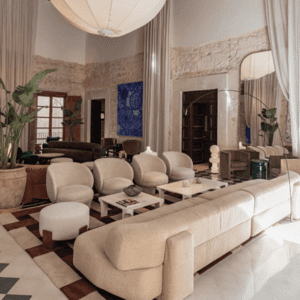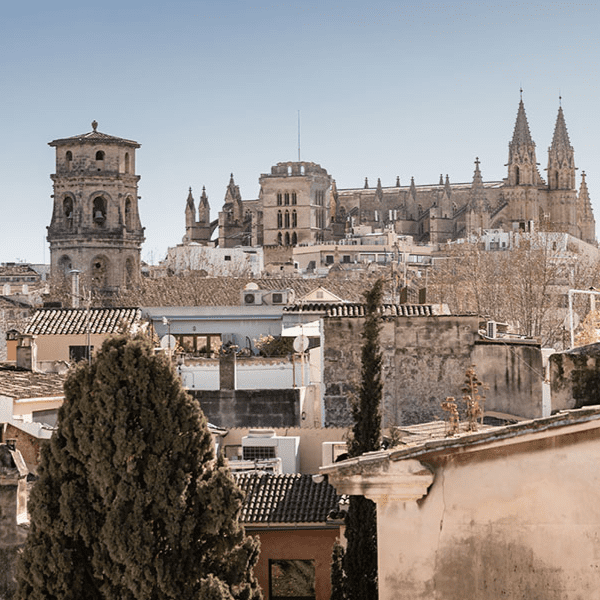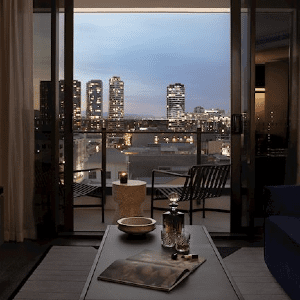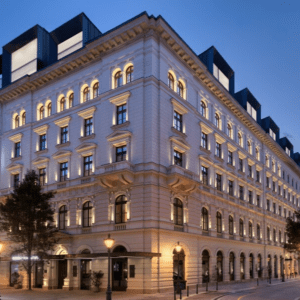Housed in one of Palma’s oldest buildings, the newly opened Nobis Hotel Palma offers contemporary luxury steeped in 1,000 years of history. Interior design by the award-winning team at Wingårdhs and architecture by the Spanish studios Jordi Herrero Arquitectos and Eduardo Garcia Acuna Arquitectos reimagines the historic setting and reveals its centuries of layers while infusing it with new life. What was once an ancient fountain is now an intimate dipping pool. A serene historic nine-meter-high ceiling is housed in a former escape-route tunnel. Soaring nine-meter-high ceilings provide a magnificent backdrop for a unique cocktail bar. Also featuring two original inner courtyards, a rooftop terrace, and a signature restaurant helmed by renowned Mallorcan chef Xema Álvarez, Nobis Hotel Palma merges the past with the present, striking a harmonious balance between old and new.
1,000 years of history. Interior design by the award-winning team at Wingårdhs and architecture by the Spanish studios Jordi Herrero Arquitectos and Eduardo Garcia Acuna Arquitectos reimagines the historic setting and reveals its centuries of layers while infusing it with new life. What was once an ancient fountain is now an intimate dipping pool. A serene historic nine-meter-high ceiling is housed in a former escape-route tunnel. Soaring nine-meter-high ceilings provide a magnificent backdrop for a unique cocktail bar. Also featuring two original inner courtyards, a rooftop terrace, and a signature restaurant helmed by renowned Mallorcan chef Xema Álvarez, Nobis Hotel Palma merges the past with the present, striking a harmonious balance between old and new.
Among the Gothic churches and scenic squares of Palma’s Old Town, one of the city’s oldest buildings has been transformed into Nobis Hotel Palma, the latest addition to Nobis Hospitality Group’s five-star portfolio, Nobis Hotels, joining locations in Stockholm and Copenhagen. Set within a medieval Islamic palace dating back to the 12th century, the hotel is organized around two symmetrical interior patios. Original to the structure, the courtyards have survived a fire and earthquake and remained when the space was reimagined as a private residence for noble Mallorcan families. Then, in the mid-15th century, the complex was renovated in a Gothic style with vaulted ceilings and imposing archways, and two centuries later, it was further reimagined in a Baroque style. Today, many features from over 1,000 years of history remain.
At Nobis Hotel Palma, past and present are meticulously blended through an interior concept by the award-winning Swedish studio Wingårdhs, led by Helena Toresson, and an architectural plan by the Spanish firms Jordi Herrero Arquitectos and Eduardo Garcia Acuna Arquitectos. Original architectural elements seamlessly merge with new additions: carefully preserved historic archways give way to unique lighting features and black steel boxes have been worked into the restored original stone and brick walls. Complementing the raw architectural base is Wingårdhs’ warm and welcoming interior design concept, where high-quality, natural materials like wood, wool, and leather embody the Nobis Hospitality Group’s signature interpretation of contemporary luxury. Offering sharp contrasts between the old and the new, the hotel strikes a stunning balance between the rough and the smooth, the raw and the refined.
Before ascending to the 37 rooms, 11 of which are suites, guests are welcomed in the lobby by a preserved wooden alfarje, or paneled ceiling, with a decorative element of Arabic calligraphy known as Naskh—an architectural accent that has miraculously survived the building’s entire history. Historic features such as this are augmented by Nordic, Spanish, and Italian design pieces from brands like Taccini, Arflex, Moroso, Fontana Arte, Davide Groppi, and Pols Potten, as well as bespoke furniture crafted on the island. Spread across three floors, each individually designed room boasts a unique shape and size that offers a one-of-a-kind experience influenced by the architectural base of the historic building. Some rooms feature centuries-old ceramic tile flooring paired with custom Carl Hansen bedframes, Flos pendant lights, and handmade tapestries by local artist Leela Romeo at Desanuda Fiber Lab. In other rooms, original wooden ceilings harmoniously juxtapose Ogeborg carpets, Örsjö tabletop lamps, and handcrafted ceramic vessels by Mallorcan artist Miquel Segura. Consciously forging connections with the island, all rooms also feature bespoke wardrobes crafted with local materials by local carpenters, as well as custom benches by the same artisans in bathrooms, bringing a warmth to the textured Spanish limestone walls and floors.
Sited from the ground floor to the roof, the hotel’s dining and imbibing options extend the blend of past and present. In a room dating back to the building’s origins, with historic nine-meter-high ceilings, is the Mirall Bar. Mirall is the Catalan word for “mirror” and this sets the space’s aesthetic tone: expertly crafted cocktails—based on local produce and seasonal ingredients—are mixed behind a bar carefully created from strips of mirrors and served on a counter made from compressed glass. Infusing this magnificent setting with an undeniable feeling of contemporaneity are artworks by Philip Smith and a grand lamp designed by Wingårdhs and crafted by Konsthantverk in textiles and fiberglass. The hotel’s signature restaurant NOI, meanwhile, serves up sharing plates inspired by the best of European cuisine but that are definitively rooted in the local food scene. Conceived by renowned Mallorcan chef Xema Álvarez, dishes are crafted from locally available produce, sourced according to a KM Zero policy as much as possible, and served against the backdrop of a back-lit textile ceiling installation and black-steel bar. A vibrant meeting point, NOI—much like chef Álvarez’s sister restaurant Xalest, located at the hotel’s sister property Concepió by Nobis—draws in guests and locals alike. Upstairs, an intimate rooftop bar, with bespoke sofas with patterned upholstery by Dedar and stools by Isimar, boasts views over the iconic La Seu Cathedral.
An ideal place to blend beach days and city life, Nobis Hotel Palma also offers plenty of areas for repose, like the Sun Terrace, a tranquil spa, and a newly transformed, historic courtyard. The Sun Terrace is equipped with parasols, sun loungers, and cooling outdoor showers amidst an abundance of greenery. Walking a few steps down reveals one of the original inner courtyards, where an ancient fountain has been carefully repurposed into a small dipping pool suitable for two. Further down—specifically, underground, in a former tunnel that functioned as an escape route during the medieval ages—the Nobis Hotel Spa is an intimate place to unwind with a heated indoor pool, dry sauna, and infrared sauna. Natural materials such as Spanish limestone and warm-toned wood, together with Stucco Lustro walls, were specially selected to create a clean and simple, yet elegant experience—one that is reflective of property’s ethos at large.
















